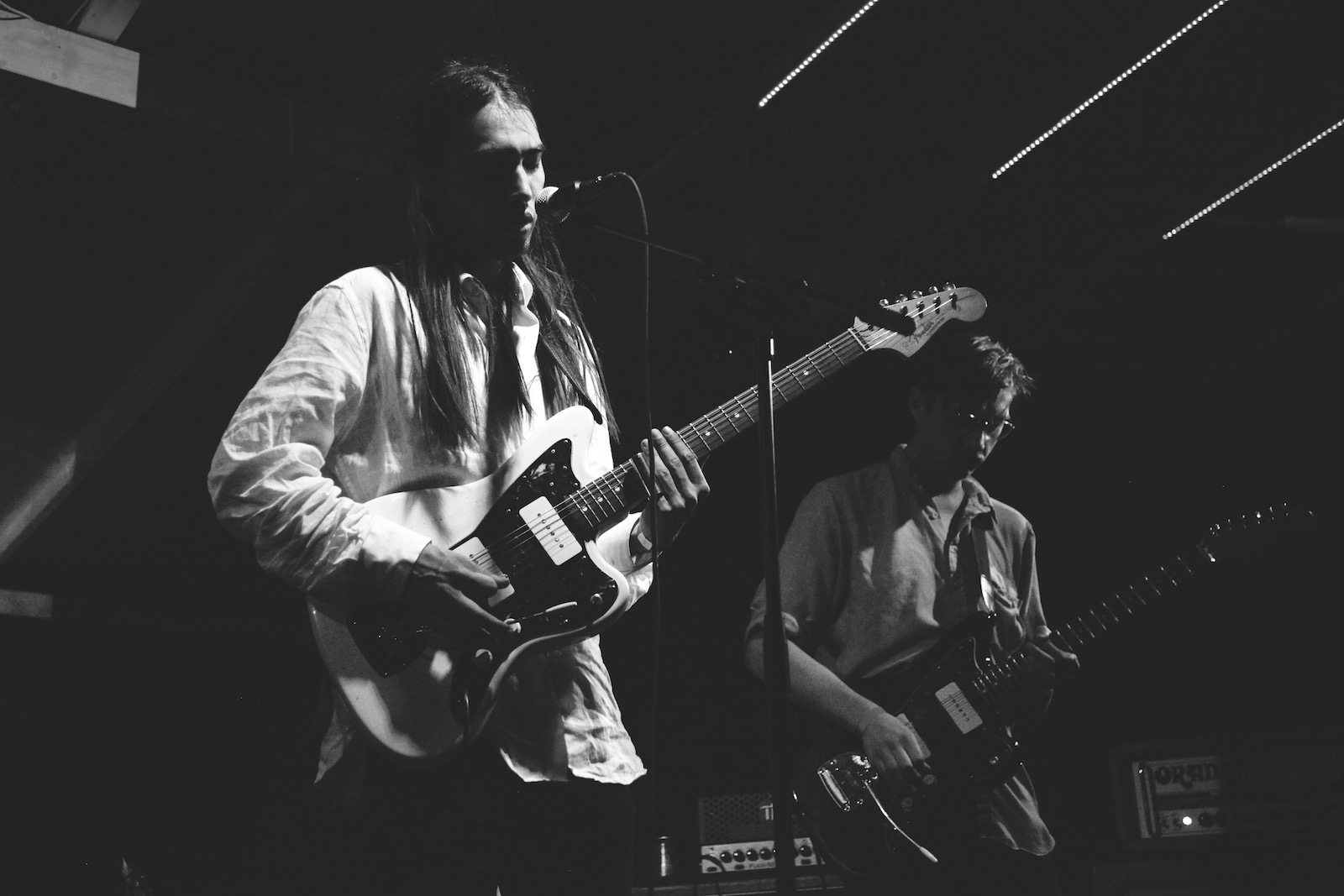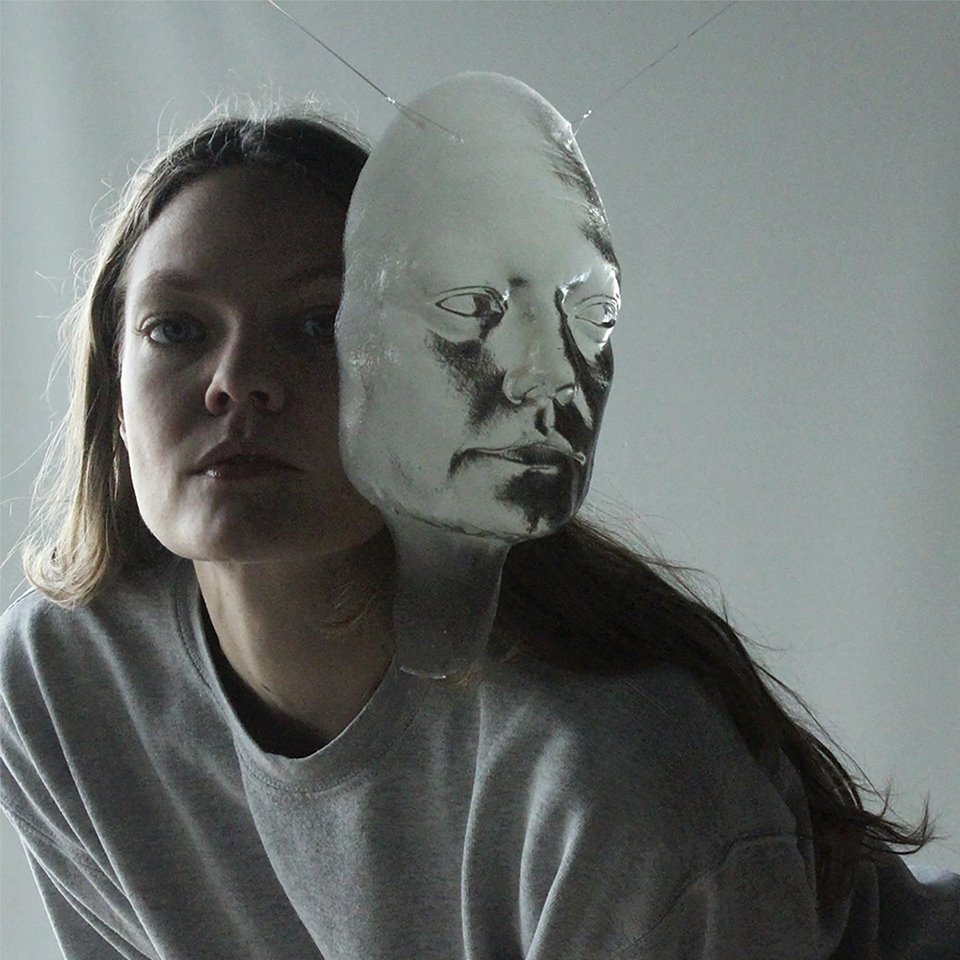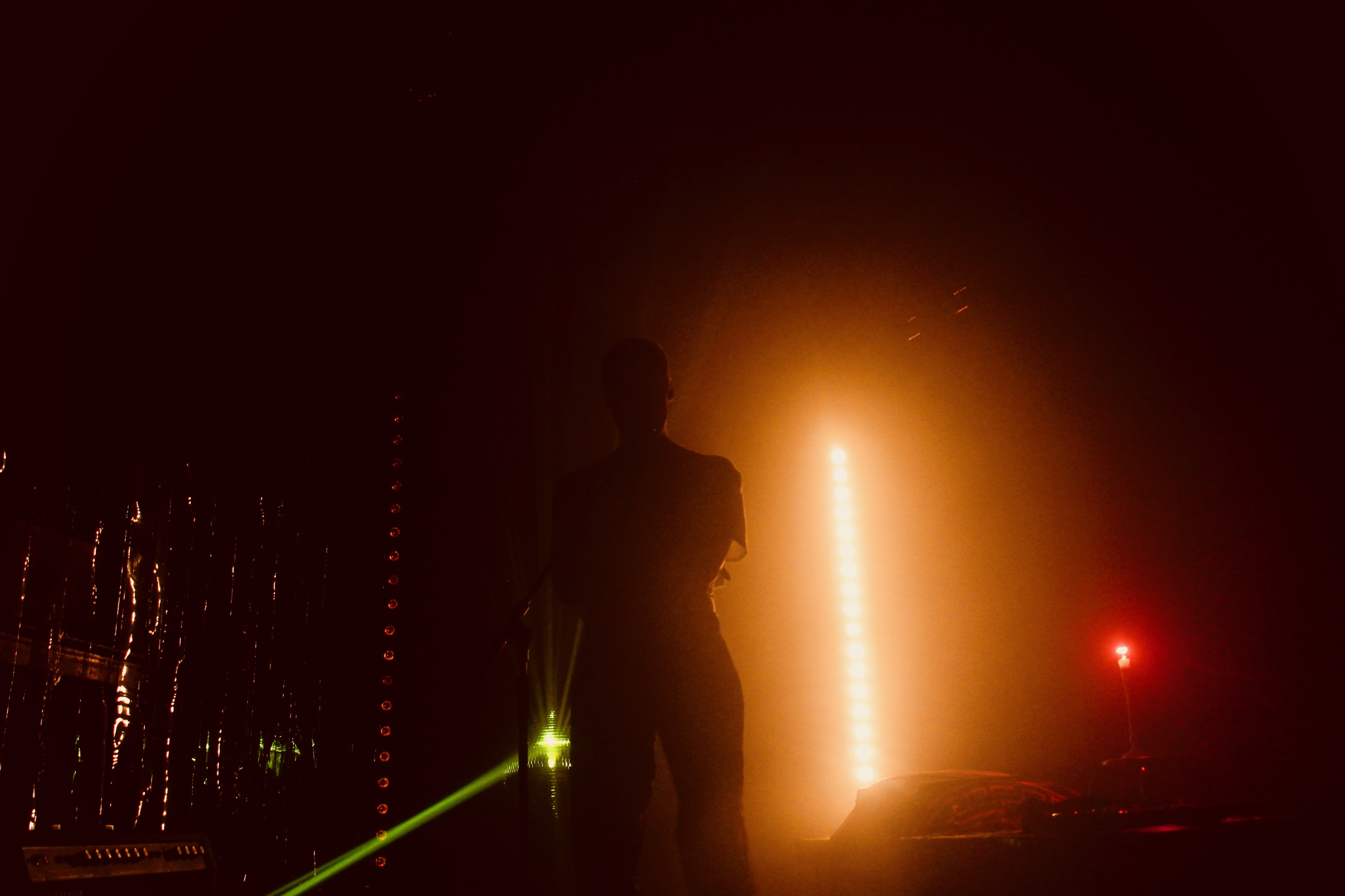Roskilde Festival 2024 – An escape for anyone
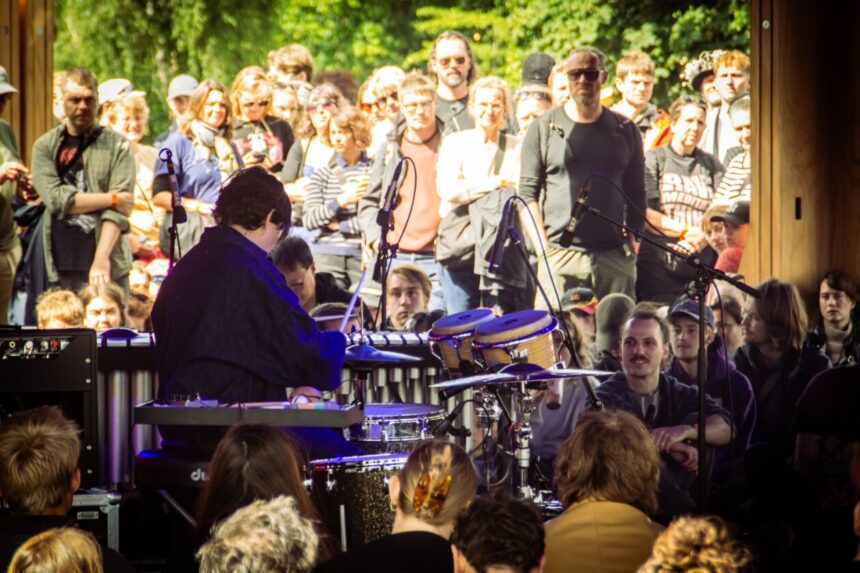
By Macon Holt
As a committed non-camper, I arrived at Roskilde 2024, my first time at the festival, on Thursday afternoon. It had been a long time since I had been such a festival. When I camped at Glastonbury in 2011, I sort of felt I had reached the peak of excitement and discomfort such festivals had to offer, so I was curious to see what more Roskilde had to offer. And I felt excited to be amongst the press this time. My first appointment was a concert on Platform by the experimental and exuberantly playful percussionist, Valentina Magaletti, with whom I had set up an interview after her solo show.
Magaletti is known both in her own right as a composer-performer and for her work with bands like Vanishing Twin (a personal favourite of mine), Moin, Holy Tongue and many others as well as her label Permanent Draft, dedicated to promoting music by women, non-binary and trans people. She put this initiative to me in reference to the recent book published by the label – “Basta Now” by Fanny Chiarello, which chronicles 2371 women, trans and non-binary practitioners of experimental music – “this not about excluding men, it’s just not about them”.
Certainly, this ethos of non-exclusivity and regard for what is fascinating in its own right was the experience of Magaletti’s performance on the Platform stage that afternoon. Playing with a fixed media recording, that Magaletti describes as a diary comprised of poetic, sonic reflections from her travels, she delivered a trance-inducing improvisation that allowed her fascination with this musical performance practice to be shared by anyone who wished to melt into it. Strikingly, her set began with Magaletti playing a small symbol and the floor into a delay-drenched microphone that made time start to stretch and fold, softening us up. Her move to the percussion rig took us deeper into the rabbit hole. Between the virtuosity of her improvisation and interplay with the fixed media, I was most mesmerised when she focused on the differences that emerged as she played a single note on the vibraphone. The interplay between the macro-rhythms of the performance structure and the micro-rhythms that gave this note its tone and timbre felt as if it unfurled a thesis about the position and power of music in human experiences more compelling and convincing than any academic text I have read.
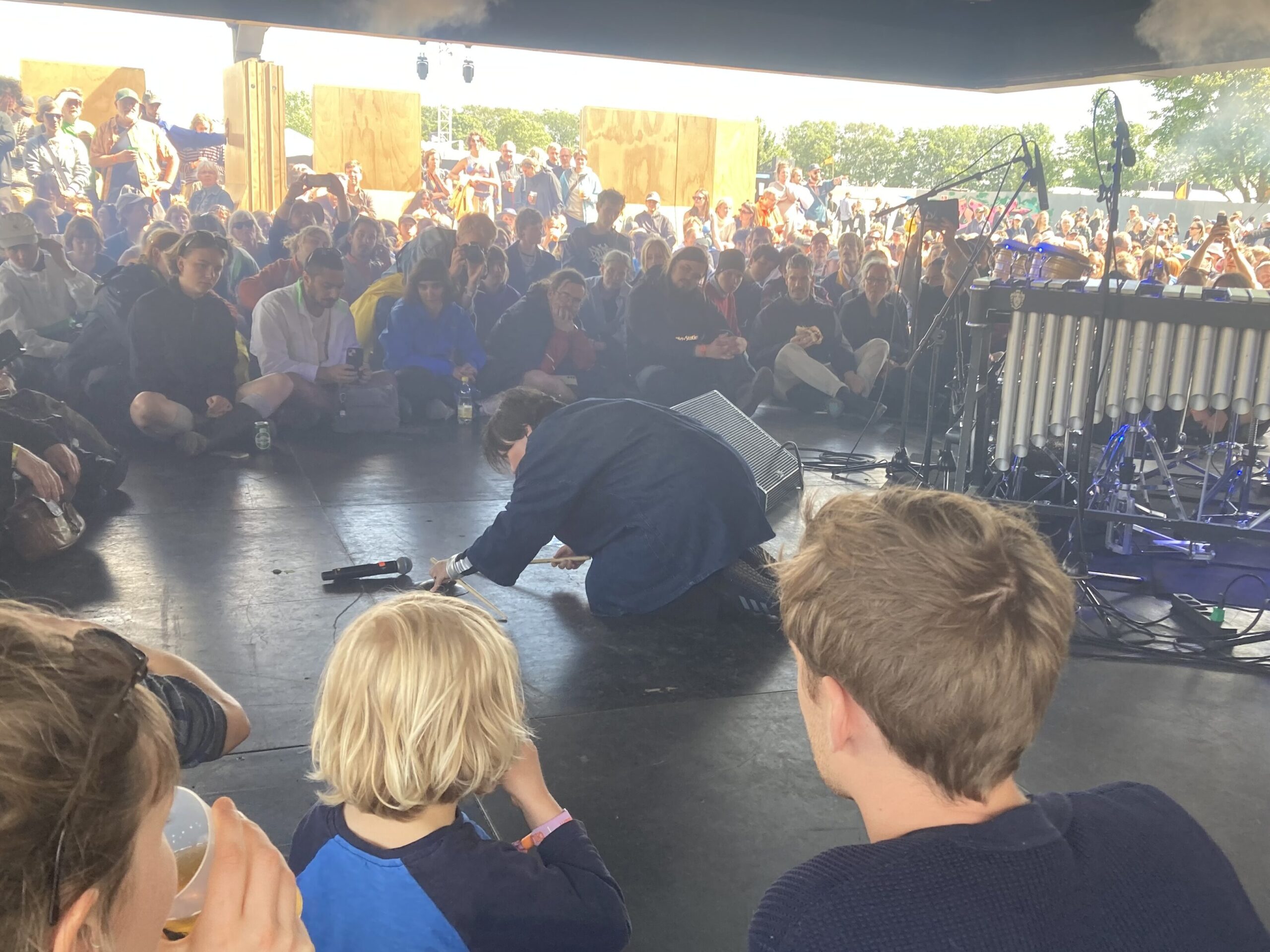
“I like to play with this dichotomy between being virtuoso – because I have studied drums so much and I can play the drums in a conventional way – but I also want to take and strip it back, like everyone is involved and everyone can have fun with it because it is primal.” – Valentina Magaletti
When I caught up with her backstage both of us still buzzing from the show and the warm reception it had received, I asked Magaletti about what drew her to percussion. “I like that there are many sides to it. It’s physical but it is also very shamanic and spiritual and very primal. I like to play with this dichotomy between being virtuoso – because I have studied drums so much and I can play the drums in a conventional way – but I also want to take and strip it back, like everyone is involved and everyone can have fun with it because it is primal. I am by now very conscious of all the various sides that drums can have and it is very important not to forget that drums are all of these things. To be honest, most of the stages here are very generic and it’s nice to show there is also something else to it.”
Grappling with the half-hour time limit she was allotted, Magaletti compared the experience of the concert to an idea expressed in the first season of True Detective. In the middle of playing, “time is a flat disk. You don’t know where you are because it’s like you’re in the middle of a conversation and but ah, you have to stop, and this I found hard”. The True Detective reference gained extra resonance, as the quote from the show is itself a nod to the idea of the eternal return of the same an ancient Greek idea made famous in the philosophy of Friedrich Nietzsche. Nietzsche used it to articulate how one should live life in all its unfairness, arduous suffering and fleeting joys. To reduce it far too much, he argued we should live each moment of our lives as if whatever we do will come around and have to be lived by us over and over again for infinity. He argued this means that we should thus act and live in ways that accord with what we desire and value and with as little regret and shame as possible in the beautiful tragedy of life.
“To me, music is just one thing. What I am after is intellectual honesty. I don’t like people pretending.”
Valentina Magaletti
As we were whisked away to the backstage area so she could get the early luxurious dinner laid on by the festival before her moving on to her next engagement, her ideas about music – both its appreciation and practice, did seem to connect with this philosophy of life. That is, Magaletti craved work that could produce complex connections by way of integrity.
“To me, music is just one thing. What I am after is intellectual honesty. I don’t like people pretending. There are loads of people who can play an instrument and they want to be able to present not to so they can do the avant-garde stuff. Pretending to be someone who is not who you are. I think it is hard to be true to yourself but it is what I seek when I put on a record. If this is true to itself, I have time for it even if it is not to my taste. It’s honest.”
Magaletti was also, however, sympathetic to the pressures that many experience in the music industry to produce what its metrics and marketing people demand. “It is hard when you’re young,” she said. This led me to ask how she had seen the industry change over the last 15 years, with changes to technologies of distribution and communication. Reflecting on a recent conversation with the manager of another artist, Magaletti told me, “The kids are very angry, and very awake and very ready for action. And that is a really great thing. Because it is positive and it’s different from 15 years ago.”
“I was always a minority and not acknowledged. And then all of a sudden time changes and then click, all the minorities are cool and I’m seen as a queer percussionist.”
Valentina Magaletti
However, Magaletti made it clear that she was under no illusions about how all this worked. Thinking back on her own journey, she tells me that “ because I come from Southern Italy even if I moved to London a long time ago, I never had it easy when I first started. I was never taken seriously. I was always like this “little girl playing the drums” and this was just like circus material. And then “a white girl wanting to play jazz” and that was also circus material. I was always a minority and not acknowledged. And then all of a sudden time changes and then click, all the minorities are cool and I’m seen as a queer percussionist.”
For Magaletti, the cynicism of others bore little consequence for her own practice and what she wants to do in the world. Indeed, she seemed to recognise the necessity of navigating the fickle nature of the business to get to do what she believes is actually important. “So obviously, I am taking that, but coming back to intellectual honesty, I don’t believe that every single booker books me because he’s into my music. Sometimes they just need to have a gender balance. And it can be the same way they book artists of colour. But now I’m just like “fuck it, I’m taking that” because I had years of work where I didn’t have that choice.”
Our conversation ranged widely over her early dinner as I snuck a glass of wine from the restaurant Magaletti shared her generously portioned meal with me. She also shared her excitement about the upcoming release of “The Tumbling Psychic Joy of Now”, the forthcoming album from her project Holy Tongue (a band comprised of herself, Al Wootton and Vanishing Twin band-mate, Susumu Mukai) in collaboration with the electronic musician Shackleton. The single, “The Merciful Lake” and its seamless fusion of seemingly egoless virtuosity from each of the composer/performers gave the track an incredibly expansive character that sounds like the complex and deftly handled world re-building project promised by the album’s title. “It’s buzzing,” she said “It’s a really exciting time for me” referring both to the hype around the record and the attention coming her way from all her prolific outputs. Then, as her handler from the festival came over to usher Magaletti to her hotel, I thanked her for her time and walked away with the giddiness that I hunt for in such conversations. Then with a few turns and twists, I exited the artist village and was transported back to the public area of the festival, dazed and confused in some ways but in others very much more grounded.
“In the days following the interview, and with Magaletti’s idea of intellectual honesty in my head, I constantly returned to the question of who this festival thinks it is for. And how can we see, hear and feel this ideal or not in the festival before us?”
Out in the Festival, Looking for Escapes
Cast back out into the festival grounds of Roskilde in 2024, I realised it is a lot like most other major northern European banner music festivals such as Glastonbury. Under the umbrella of what gets called popular music, which contains everything from rock n’ roll hall-of-famers, to pop royalty, to that EDM that the kids like and little corners for musicians whose practice tends to get lumped with the prefix “art-“. Between these are generic beer tents of the festival’s major sponsor, Tuborg, which is ultimately Carlsberg the major sponsor of so much of Danish culture, selling the brew that made them rich and famous. There are scattered marquees selling sustenance as as junk food treats or strictly portioned, biodynamic, culinary delights that might just save the world if the product launch goes well. Surrounded by I was reminded of the name of a niche music festival in Brighton, The Great Escape. Suddenly, it seemed that all these delights in Roskilde were facilitating the escapes of around 100,000 people into a space of ecstatic revelry in stark contrast with daily lives that rarely reach such exciting heights.
Between the crowds and the crowd control, and the general discomfort of walking around exposed to the indecisive Danish weather of its anthropocene summers, it can feel like there is a lot to keep track of, which in turn can be a little alienating. In the days following the interview, and with Magaletti’s idea of intellectual honesty in my head, I constantly returned to the question of who this festival thinks it is for. And how can we see, hear and feel this ideal or not in the festival before us? How does it come across? So the question I asked throughout the festival was, how did Roskilde facilitate a desire for escape?
“When a friend of mine leaned over to me at the end of the set and declared it to have been the future of pop, I could only agree with all the ambivalence that phrase embodied.”
The Future of Pop
Later that night, as I stood in Gloria watching the Japanese, rave metal kawaii band, Violent Magic Orchestra, in a wash of bass, vocal screeches and the high-production cute horror animation that accompanied the show the precise dissonance of the festival began to take shape. The desire Roskilde tries to satiate is one of escape. But every motivation for escape is different as is the dream of where one could escape to. The signifiers of Violent Magic Orchestra offered up one possibility but at the same time, the floating cosmic skulls and deformed teddy bear spirals still seemed so attached to the world as it is that they frustrated their own escape. This also came across musically. With the exception of the scream buried in the mix, the relentless bass didn’t seem to have anything to cut through. This shifted in for a moment in the penultimate track with its heavily filtered “Amen Breaks” that, ironically through a reference, seemed to work through this resistance in a way that felt genuinely exciting. When a friend of mine leaned over to me at the end of the set and declared it to have been the future of pop, I could only agree with all the ambivalence that phrase embodied.
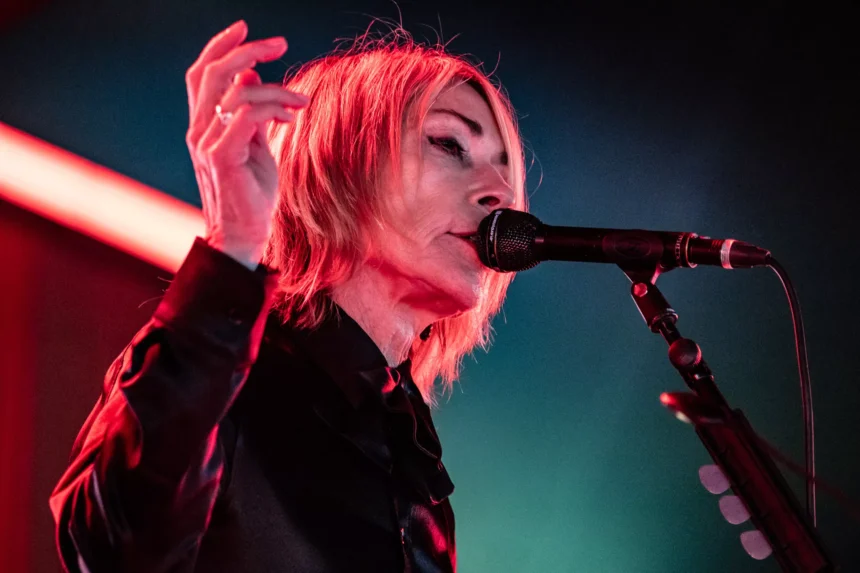
How to Pay Attention
The next day watching Kim Gordon (co-founder of the no-wave pioneers, Sonic Youth) at Avalon, a hero of mine and fellow traveller that Magaletti was sad to have to miss, I found a clearer articulation of the tension I felt playing out in the festival. Drawing on material from a career that spans more than four decades, Gordon’s abrasive and spoken word-informed style did indeed provide that kind of intellectual honesty Magaletti had spoken about. Gordon is an artist whose work directly confronts the struggle for escape and the pain of realising that desire alone is far from enough to build a life from. But as this performance showcased, Gordon doesn’t take the reality of this difficulty as an excuse to declare defeat but challenges these realities with noised soaked declarations that still demand our attention.
Dodging rain into the evening, I arrived for ML Buch’s sunset concert at Gaia. Buch’s reputation in the Danish independent music scene as a unique talent in both songwriting and stage charisma is well deserved. She delivered her signature ethereal vocals with lyrics that explore the very real depths of emotional pain set against synth beats and guitars arranged to charge them with a euphoric melancholy. Buch too seemed to be negotiating between the escapes on offer at the festival with the real connections that made all of this possible through evoking the fantasy of waking dreams. This was most evident when, toward the end of her set she brought on seven guitar players to join her and her drummer on stage. While the passages that followed contained fascinating multivocal sections that allowed each of the guitarists to weave threads through songs, the moments that stood out most to me were the unison passages. Or to put it better, what was fascinating was the impossibility of unison. The humidity, the way the different instruments had held or not held the tuning and the differences in technique of each individual player, as they attempted to play the same thing, made the soundscape glisten with the dissonance of difference in any fantasy of escape. These differences and dissonances we so often try to ignore but make such dreams worth holding on to.
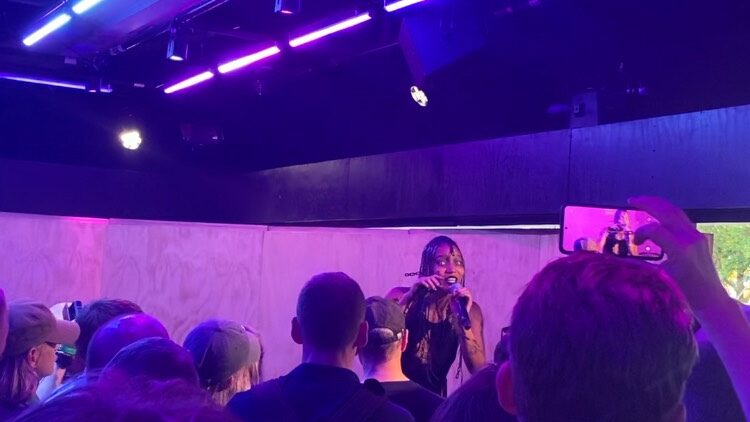
Who gets to Fuck the World?
Squelching through the mud of the sodden festival grounds on the last day, I could however feel my energy waning. But there were still moments that captivated me. Pö, the pseudonym of the Ghanaian-French artist, artist Pauline Bedarida, performed to a dumbstruck crowd at Platform. While I can’t be sure, I think many of the people sitting in Platform that afternoon had just taken shelter in the small art stage to avoid the intermittent showers. So they were fabulously unsettled as Pö’s contorted form, her head dangling with long black chains and mesmerising white contacts insinuated itself among the audience like a spirit awakened by our apparent obliviousness to what has come before. Pö whispered in the ear of unsuspecting festival-goers often resulting in nervous smiles that were as revelling as they were dissociative. When she reached the stage as the beats were building, Pö growled at the still-seated audience to get up. And as the petulant resistance and genuine confusion of the crowd, Pö commanded us again, much more instantly than the first time. Everyone immediately got on board and, as she delivered the set, the stakes of escape into a felt history that is alien to most of those who come to Roskilde looking for a good time.
A little earlier I had seen the Danish artist Barbro play in a packed tent at Avalon. It was an exciting event for me for a couple of reasons. For one, it was hard to believe that this young person commanding the crowd was the same person who had participated in a guest lecture I once did at The University of Copenhagen and about pop music and capitalist realism. But thinking back to how insistent they had been to find some way through my theoretical negativity it made sense. Even in that singular meeting, their drive was apparent.
The second reason was that Barbro’s work reimagines the kind of grunge and alt-rock that was so formative to my teenage musical education into a contemporary cultural context. The basic insight into the spiralling despair of the moment called “the end of history” from which grunge was born, had some validity. At its best, this genre grappled with the feeling that it was impossible to live if nothing could ever be allowed to change. But this often leads to cynicism or worse a kind of wounded narcissism from which nothing could be built.
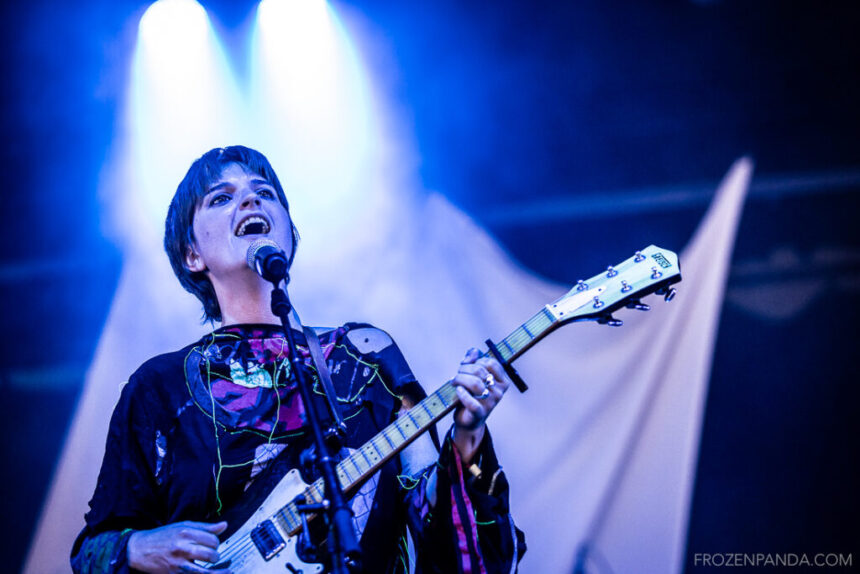
Barbro’s work has come about after that generational malaise. One moment that stood out was Barbro’s performance of “Fuck the Word” from their debut album. With a jangly guitar riff reminiscent of Adore-era Smashing Pumpkins, the song uses only a few words to cut threw the rationales that provide the intoxicating seduction of defeat. “What do I prefer?” start the refrain “And what do you deserve? You had me at like fuck the world”. These slurred lines were set against an agonised wail that also revealed the pleasure of living through these dilemmas of stuckness. For all their pain and complexity, the problems that underly the question Barbro asks evoke a hunger that will always make the sentiment of “fuck the world” incoherent. The desire for escape here may have been beaten down but, as we moan, we also assert the desire to make the world into something else.
Can a Festival be for Everyone?
Thinking back on Magaletti’s words about how what was important to her was encountering the particularity of the people making the music, I considered how to account for the incoherent rush of Roskilde. I thought about the parties that were had that I could never have been a part of, the excitement that was for others that would never be my own, and the over-50-year-old institution. An institution that made this possible through a consistent but inherently compromised navigation of a political order that sells a narrow idea of the good life. For example, the official declarations of inclusivity and the money raised by the festival for charity on the main stage screens between concerts were welcome sentiments but at the same time couldn’t help but feel performative. Not that they are fake but that these messages insist upon fixing a reality in which your escape was, first and foremost, the right thing to do, which feels somewhat beside the point of being here.
“(…) the problems that underly the question Barbro asks evoke a hunger that will always make the sentiment of “fuck the world” incoherent.”
This is not to take away from the good that the millions of kroner the festival has raised through its charitable status, nor is it to dismiss the space the festival has made for art and activism in its program. But rather, in 2024, these things carry with them the same ambivalently pained wail that Barbro let out. We live in a world where this charity remains necessary to keep the status quo afloat. And when this escape is over, that will be the world we will return to and in many ways continue to perpetuate. In attempting to be a festival for everyone – an absurdity that should be apparent from how rarified access is to the corner of Europe we were standing on – Roskilde accidentally reveals a deeper truth. This festival may wish that you believe coming to it is a good thing to do beyond the pleasure you get from it. But really the festival is only a tool we might be able to use. Not in the sense of “it is what you make of it”. Rather, Roskilde Festival is a partially open resource for those who didn’t choose these circumstances to be the ones under which they form community, resistance or expression. But they can and they do; both for the artists and the audience who engage with it to address their underlying desire for escape.
As I walked through the camping area to the bus, awash in mud and the detritus of a week of letting go, the festival led me to think about the fragility we all live under at a moment in history that feels like the eve of crisis for some and its unambiguous arrival for others. At the same time, with all the caveats, this space can host the proliferation of joy and love as it helps us, momentarily, to look at the pretence of the formerly happiest country in the world.

